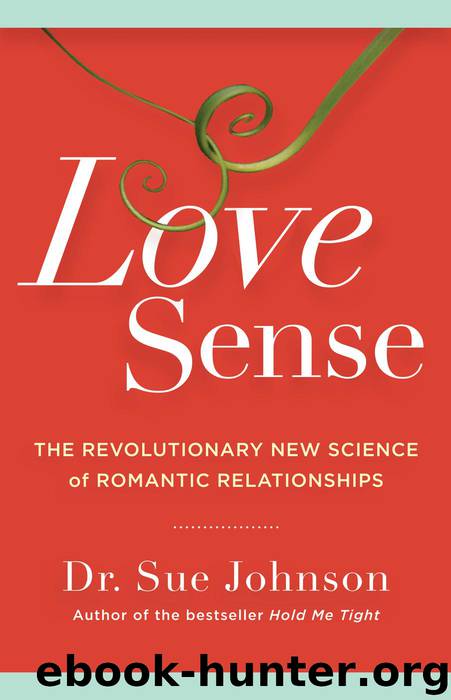Love Sense: The Revolutionary New Science of Romantic Relationships by Johnson Sue

Author:Johnson, Sue [Johnson, Sue]
Language: eng
Format: epub, mobi
Publisher: Little, Brown and Company
Published: 2013-12-31T00:00:00+00:00
Beyond Retirement
Retirement can be an acute crisis, usually lasting for a year or two at most. But then there are all those years after retirement. What keeps a love relationship going in our waning years? And how important is it?
A multitude of studies show that a positive, close relationship is one of the best predictors of longevity and physical and mental health. In one pioneering study, University of California psychologist Howard Friedman and his colleague Leslie Martin analyzed data on 1,500 middle-class folks who were born around 1910 in California. The voluminous records traced their lives over eight decades until their deaths, detailing their experiences and habits through prosperity, the Great Depression, and two world wars. The notations included everything from the happiness of their parents’ marriage to their career choice to the number of books they had in their home.
Friedman concluded that medical advances play a minor role in extending life span. “Most people who live to old age do not do so because they have beaten cancer, heart disease, depression, or diabetes,” he says. “Instead, the long-lived avoid serious ailments altogether through a series of steps that rely on long-lasting, meaningful connections with others.”
In other words, you can eat special organic and gluten-free foods, gulp down multivitamins, get yourself to the gym, and meditate into a stress-free zone, but the best tonic for staying healthy and happy into old age is probably toning up your relationship.
Being attached to a partner buffers us when illness strikes. Psychologists Anthony Mancini and George Bonanno of Columbia University questioned more than 1,500 elderly married couples living in Detroit. One member of each pair had a heightened sense of mortality due to a physical disability that made routine tasks, such as bathing, dressing, climbing stairs, and picking up heavy objects, difficult to accomplish on their own. The researchers discovered that self-esteem was higher and depression and anxiety lower in the handicapped people who had an emotionally responsive mate. Having a spouse who was willing to listen to their worries and made them feel loved made more of a difference to their mental well-being than did help with buttoning shirts, tying shoelaces, and the like.
Other studies reinforce these findings. It is emotional support—expressing concern and allowing partners to express their feelings—that sustains health and helps maintain optimum functioning of our body’s cardiovascular, hormonal, and immune systems. And it is emotional support, not physical assistance or pragmatic advice, that most cushions us from the stress and strain of illness when it occurs.
Sybil, 68, suffers from chronic arthritis. She tells her husband, Harry, a spry 75, “You can help me best by being there for me and showing that I am important to you and you care. I don’t need all that advice; it just distresses me. I need you.” Harry looks puzzled, but I can assure him that she means this literally and that his closeness can make a real difference. As we grow older, secure connection with a loved and loving partner becomes an even more vital resource.
Download
Love Sense: The Revolutionary New Science of Romantic Relationships by Johnson Sue.mobi
This site does not store any files on its server. We only index and link to content provided by other sites. Please contact the content providers to delete copyright contents if any and email us, we'll remove relevant links or contents immediately.
Should I Stay or Should I Go? by Ramani Durvasula(7652)
Why We Sleep: Unlocking the Power of Sleep and Dreams by Matthew Walker(6705)
Fear by Osho(4727)
Flow by Mihaly Csikszentmihalyi(4687)
Rising Strong by Brene Brown(4449)
Why We Sleep by Matthew Walker(4434)
The Hacking of the American Mind by Robert H. Lustig(4375)
How to Change Your Mind by Michael Pollan(4355)
Too Much and Not the Mood by Durga Chew-Bose(4337)
Lost Connections by Johann Hari(4173)
He's Just Not That Into You by Greg Behrendt & Liz Tuccillo(3891)
Evolve Your Brain by Joe Dispenza(3671)
The Courage to Be Disliked by Ichiro Kishimi & Fumitake Koga(3488)
Crazy Is My Superpower by A.J. Mendez Brooks(3398)
In Cold Blood by Truman Capote(3374)
Resisting Happiness by Matthew Kelly(3337)
What If This Were Enough? by Heather Havrilesky(3308)
The Book of Human Emotions by Tiffany Watt Smith(3300)
Descartes' Error by Antonio Damasio(3270)
